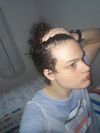community No results for 1 year till I tried this.
The user saw no hair loss improvement for a year using 1mg finasteride and 5% minoxidil. They experienced better results after reducing finasteride to 0.25mg, adding a derma pen treatment, and applying a solution with minoxidil and melatonin.
